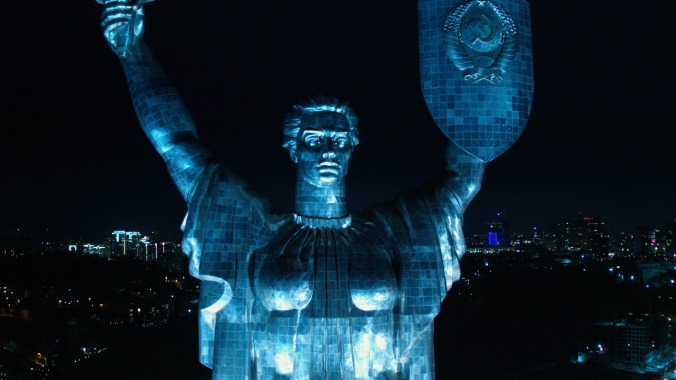New HBO documentary roots out the Agents Of Chaos who meddled in the 2016 election


Of the many memes that have come to define the Trump era, “But her emails!” has reached iconic status. Set against a backdrop of a town sinking underwater, it’s a way to signal that so much of our current disaster could have been averted had enough people in swing states voted for Hillary Clinton in the 2016 elections. Here’s a question: What email scandal is it actually referring to? The Democratic National Convention leaks? Clinton’s use of a private server? The emails found during the Anthony Weiner investigation? The Podesta emails dumped by Wikileaks? Does anyone even remember those four separate yet interconnected scandals, or the concerns over Russian meddling? Do we really know what “Russian meddling” even means?
If you still can’t clearly define even one of the many tangled aspects of the hellish 2016 election, the new HBO docuseries Agents Of Chaos is here to give viewers a crash course on what Russian interference consisted of during the presidential campaign. Directed by the award-winning and prolific documentarian Alex Gibney (The Inventor: Out For Blood In Silicon Valley, Going Clear: Scientology And The Prison Of Belief) and Javier Alberto Botero, the documentary parses out the multiple-pronged approach the Russian government used to undermine the democratic process in the United States.
Divided into two two-hour episodes, the first half of the documentary focuses on the work of Russian troll farms and the hacker operations of two different Russian intelligence services, the GRU and the SVR. The second part focuses on the allegations of collusion between the Trump campaign and the Russian government, giving an overview of the different leaks and scandals that rocked the DNC and the questionable decisions made by the government to prevent further interference. Though there is previously unseen footage of troll farms and candid interviews from key figures, Agents Of Chaos doesn’t drop huge bombshells. Most of what’s described is already out there in the news, dissected to the point of exhaustion. What it does very successfully, though, is lay out an organized summary of the intricate web of fuckery Putin may have weaved, but that the United States was open to receive because of our own rabid homegrown dysfunction.
The result is a dizzying, overwhelming, yet compelling presentation of the different tactics the Russians employed. There is an effort to divide each aspect of Russian interference into easily digestible bites, but it proves to be an extremely difficult feat because of how convoluted it actually was. It’s a documentary that demands you actively engage with its content in order to keep track of every thread. If there wasn’t substantial evidence to back up some of the claims, it would sound like an unhinged conspiracy rant in a dark corner of the subreddit universe. Viewers may come out of the experience feeling caught up in another recognizable meme of our times: the Pepe Silvia scene in
It’s Always Sunny In Philadelphia.
Gibney interviews dozens of experts, journalists, government officials, whistleblowers, analysts, and university professors to guide us through the chaos. Though there are recognizable figures, including the likes of John Podesta and Harry Reid, the ones that really shine work in the less glamorous aspects of politics. Celeste Wallander, a former senior director of the Russia/Eurasia National Security Council, provides a sobering look at how the political upheaval in the Ukraine was a precursor to what later occurred here and the frustrating ways in which the U.S. government failed to take decisive action on the Russian attacks.
Camille François, a cybersecurity analyst who investigated the 2016 Russian interference, also offers a fascinating look into how the troll factories work. This is one of the highlights of the documentary, perhaps because it shows how truly mundane the task of sowing hatred and discord can be. Any person who has ever worked for a marketing firm will recognize the trolls’ strategies, which included keyword search and sharing posts from each other’s fake accounts in a circle jerk meant to flood other people’s feeds with their content. As Agents Of Chaos points out, Russian troll farms are not actual hackers (though hackers did play other roles in 2016). They simply use the platform the way influencers do.
The documentary also profiles a handful of sketchy figures, demonstrating how the U.S. was pushed to the edge by men who Glenn Simpson, founder of the research firm Fusion GPS, characterizes as “horny, hungry, ambitious, maybe not that bright, maybe a little bit eccentric.” It can be jaw-dropping to learn that Putin’s right-hand man in terms of troll operations used to be a former hot dog salesman, or how a cheesy wannabe pop star by the name of Emin Agalov became embroiled in the Mueller investigation. Carter Page, foreign policy advisor for the Trump campaign in 2016, comes off as particularly daft. One wonders if the reason he agreed to speak for the cameras was a result of a particularly acute case of the Dunning-Kruger effect. As Andrew McCabe, former deputy director of the FBI notes, “It is the lack of sophistication that might make them particularly dangerous” and susceptible to the machinations of savvier and more powerful leaders.
This can be rage-inducing and depressing. It might also make some of us feel very smug, secure that we are above such manipulations. Not so fast—as François explains why the trolls were so effective, “they’re not injecting in that bloodstream anything that wasn’t already there.” But in a documentary with a cacophony of voices, there is one that is missing: that of American voters. Time and time again, we hear from experts that Russian interference was so successful because we were vulnerable. We were already polarized. We were primed to be pushed and prodded into echo chambers, bubbles and villainization, to the point where the infrastructure hackers planted to corrupt election results proved unnecessary, according to Agents Of Chaos.
The documentary attempts no explanation as to how our polarization came to be, which can be incredibly frustrating. We are living in a reality where facts have been rendered even more meaningless, leaving one to wonder if the goal of functioning as a warning for 2020 is futile. The documentary may answer many questions, but it fails to answer the most vexing question of all: How did the United States get to be that malleable? Felix Sater, one of Trump’s former business associates, shares the following Churchill quote in his interview: “Russia is a riddle wrapped in a mystery inside an enigma.” But in Agents Of Chaos, that quote feels more applicable to us.